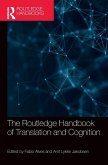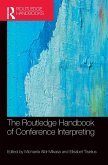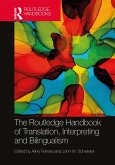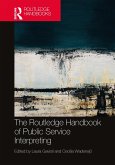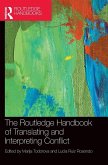The Routledge Handbook of Interpreting and Cognition
Herausgeber: Mellinger, Christopher D.
The Routledge Handbook of Interpreting and Cognition
Herausgeber: Mellinger, Christopher D.
- Gebundenes Buch
- Merkliste
- Auf die Merkliste
- Bewerten Bewerten
- Teilen
- Produkt teilen
- Produkterinnerung
- Produkterinnerung
The Routledge Handbook of Interpreting and Cognition presents in-depth discussions of cognitive aspects of the task of interpreting and how researchers and practitioners alike have applied these findings to the practice of interpreting.
Andere Kunden interessierten sich auch für
![The Routledge Handbook of Translation and Cognition The Routledge Handbook of Translation and Cognition]() The Routledge Handbook of Translation and Cognition272,99 €
The Routledge Handbook of Translation and Cognition272,99 €![The Routledge Handbook of Conference Interpreting The Routledge Handbook of Conference Interpreting]() The Routledge Handbook of Conference Interpreting266,99 €
The Routledge Handbook of Conference Interpreting266,99 €![The Routledge Handbook of Translation, Interpreting and Bilingualism The Routledge Handbook of Translation, Interpreting and Bilingualism]() The Routledge Handbook of Translation, Interpreting and Bilingualism233,99 €
The Routledge Handbook of Translation, Interpreting and Bilingualism233,99 €![The Routledge Handbook of Public Service Interpreting The Routledge Handbook of Public Service Interpreting]() The Routledge Handbook of Public Service Interpreting234,99 €
The Routledge Handbook of Public Service Interpreting234,99 €![The Routledge Handbook of Translating and Interpreting Conflict The Routledge Handbook of Translating and Interpreting Conflict]() The Routledge Handbook of Translating and Interpreting Conflict281,99 €
The Routledge Handbook of Translating and Interpreting Conflict281,99 €![The Routledge Companion to Translation Studies The Routledge Companion to Translation Studies]() Jeremy MundayThe Routledge Companion to Translation Studies131,99 €
Jeremy MundayThe Routledge Companion to Translation Studies131,99 €![The Routledge Handbook of Chinese Interpreting The Routledge Handbook of Chinese Interpreting]() The Routledge Handbook of Chinese Interpreting263,99 €
The Routledge Handbook of Chinese Interpreting263,99 €-
-
-
The Routledge Handbook of Interpreting and Cognition presents in-depth discussions of cognitive aspects of the task of interpreting and how researchers and practitioners alike have applied these findings to the practice of interpreting.
Produktdetails
- Produktdetails
- Verlag: Routledge
- Seitenzahl: 474
- Erscheinungstermin: 7. Oktober 2024
- Englisch
- Abmessung: 250mm x 175mm x 30mm
- Gewicht: 990g
- ISBN-13: 9780367277260
- ISBN-10: 0367277263
- Artikelnr.: 70351678
- Herstellerkennzeichnung
- Libri GmbH
- Europaallee 1
- 36244 Bad Hersfeld
- gpsr@libri.de
- Verlag: Routledge
- Seitenzahl: 474
- Erscheinungstermin: 7. Oktober 2024
- Englisch
- Abmessung: 250mm x 175mm x 30mm
- Gewicht: 990g
- ISBN-13: 9780367277260
- ISBN-10: 0367277263
- Artikelnr.: 70351678
- Herstellerkennzeichnung
- Libri GmbH
- Europaallee 1
- 36244 Bad Hersfeld
- gpsr@libri.de
Christopher D. Mellinger is associate professor of Spanish at UNC Charlotte. He is co-author of Quantitative Research Methods in Translation and Interpreting Studies and co-editor of Translating Texts: An Introductory Coursebook on Translation and Text Formation.
Introduction
Interpreting and cognition: An introduction
PART I: Foundations
Chapter 1 - Written words speak as loud: On the cognitive differences
between translation and interpreting
Chapter 2 - Expertise in interpreting as an interlingual reformulation
skill: Bridging concepts and revisiting paradigms
Chapter 3 - Cognitive models of interpreting
Chapter 4 - The dark load of simultaneous interpreting: Interpreters doing
it to themselves?
PART II: Disciplinary traditions
Chapter 5 - Interpreting, bilingualism, and language control
Chapter 6 - Interpreting and second language acquisition
Chapter 7 - Interpreting and neuroscience
Chapter 8 - Interpreting, phonetics, and phonology
Chapter 9 - Interpreting and psychometrics
PART III: Practices and Processes
Chapter 10 - The linguistic phenotype of multilinguals with interpreting
experience
Chapter 11 - Cognition and interpreting aptitude
Chapter 12 - Non-standard input in interpreting (research)
Chapter 13 - Interpreting and language comprehension
Chapter 14 - Interpreting and language proficiency
Chapter 15 - Interpreting, metacognition, and self-regulation
Chapter 16 - Interpreting and memory
Chapter 17 - Interpreting and language production
PART IV: Critical topics
Chapter 18 - Interpreting, affect, and emotion
Chapter 19 - Interpreting and embodied cognition
Chapter 20 - Explicitation and cognition
Chapter 21 - Interpreting and individual differences
Chapter 22 - Interpreting and moral cognition
Chapter 23 - Interpreting and note-taking
Chapter 24 - Interpreting and technologies
Chapter 25 - Interpreting, training, and education
Index
Interpreting and cognition: An introduction
PART I: Foundations
Chapter 1 - Written words speak as loud: On the cognitive differences
between translation and interpreting
Chapter 2 - Expertise in interpreting as an interlingual reformulation
skill: Bridging concepts and revisiting paradigms
Chapter 3 - Cognitive models of interpreting
Chapter 4 - The dark load of simultaneous interpreting: Interpreters doing
it to themselves?
PART II: Disciplinary traditions
Chapter 5 - Interpreting, bilingualism, and language control
Chapter 6 - Interpreting and second language acquisition
Chapter 7 - Interpreting and neuroscience
Chapter 8 - Interpreting, phonetics, and phonology
Chapter 9 - Interpreting and psychometrics
PART III: Practices and Processes
Chapter 10 - The linguistic phenotype of multilinguals with interpreting
experience
Chapter 11 - Cognition and interpreting aptitude
Chapter 12 - Non-standard input in interpreting (research)
Chapter 13 - Interpreting and language comprehension
Chapter 14 - Interpreting and language proficiency
Chapter 15 - Interpreting, metacognition, and self-regulation
Chapter 16 - Interpreting and memory
Chapter 17 - Interpreting and language production
PART IV: Critical topics
Chapter 18 - Interpreting, affect, and emotion
Chapter 19 - Interpreting and embodied cognition
Chapter 20 - Explicitation and cognition
Chapter 21 - Interpreting and individual differences
Chapter 22 - Interpreting and moral cognition
Chapter 23 - Interpreting and note-taking
Chapter 24 - Interpreting and technologies
Chapter 25 - Interpreting, training, and education
Index
Introduction
Interpreting and cognition: An introduction
PART I: Foundations
Chapter 1 - Written words speak as loud: On the cognitive differences
between translation and interpreting
Chapter 2 - Expertise in interpreting as an interlingual reformulation
skill: Bridging concepts and revisiting paradigms
Chapter 3 - Cognitive models of interpreting
Chapter 4 - The dark load of simultaneous interpreting: Interpreters doing
it to themselves?
PART II: Disciplinary traditions
Chapter 5 - Interpreting, bilingualism, and language control
Chapter 6 - Interpreting and second language acquisition
Chapter 7 - Interpreting and neuroscience
Chapter 8 - Interpreting, phonetics, and phonology
Chapter 9 - Interpreting and psychometrics
PART III: Practices and Processes
Chapter 10 - The linguistic phenotype of multilinguals with interpreting
experience
Chapter 11 - Cognition and interpreting aptitude
Chapter 12 - Non-standard input in interpreting (research)
Chapter 13 - Interpreting and language comprehension
Chapter 14 - Interpreting and language proficiency
Chapter 15 - Interpreting, metacognition, and self-regulation
Chapter 16 - Interpreting and memory
Chapter 17 - Interpreting and language production
PART IV: Critical topics
Chapter 18 - Interpreting, affect, and emotion
Chapter 19 - Interpreting and embodied cognition
Chapter 20 - Explicitation and cognition
Chapter 21 - Interpreting and individual differences
Chapter 22 - Interpreting and moral cognition
Chapter 23 - Interpreting and note-taking
Chapter 24 - Interpreting and technologies
Chapter 25 - Interpreting, training, and education
Index
Interpreting and cognition: An introduction
PART I: Foundations
Chapter 1 - Written words speak as loud: On the cognitive differences
between translation and interpreting
Chapter 2 - Expertise in interpreting as an interlingual reformulation
skill: Bridging concepts and revisiting paradigms
Chapter 3 - Cognitive models of interpreting
Chapter 4 - The dark load of simultaneous interpreting: Interpreters doing
it to themselves?
PART II: Disciplinary traditions
Chapter 5 - Interpreting, bilingualism, and language control
Chapter 6 - Interpreting and second language acquisition
Chapter 7 - Interpreting and neuroscience
Chapter 8 - Interpreting, phonetics, and phonology
Chapter 9 - Interpreting and psychometrics
PART III: Practices and Processes
Chapter 10 - The linguistic phenotype of multilinguals with interpreting
experience
Chapter 11 - Cognition and interpreting aptitude
Chapter 12 - Non-standard input in interpreting (research)
Chapter 13 - Interpreting and language comprehension
Chapter 14 - Interpreting and language proficiency
Chapter 15 - Interpreting, metacognition, and self-regulation
Chapter 16 - Interpreting and memory
Chapter 17 - Interpreting and language production
PART IV: Critical topics
Chapter 18 - Interpreting, affect, and emotion
Chapter 19 - Interpreting and embodied cognition
Chapter 20 - Explicitation and cognition
Chapter 21 - Interpreting and individual differences
Chapter 22 - Interpreting and moral cognition
Chapter 23 - Interpreting and note-taking
Chapter 24 - Interpreting and technologies
Chapter 25 - Interpreting, training, and education
Index



